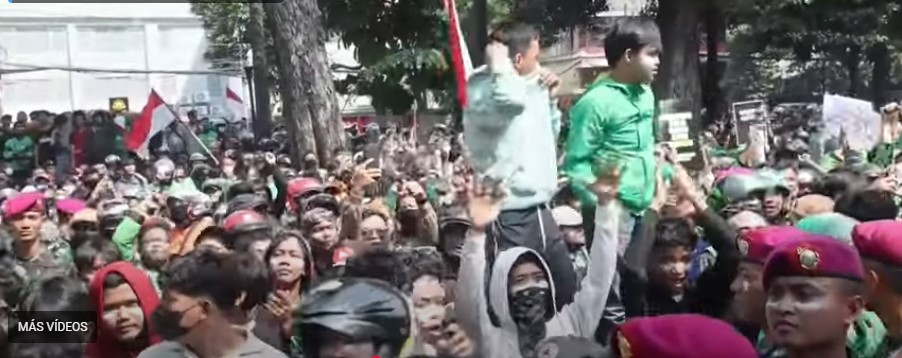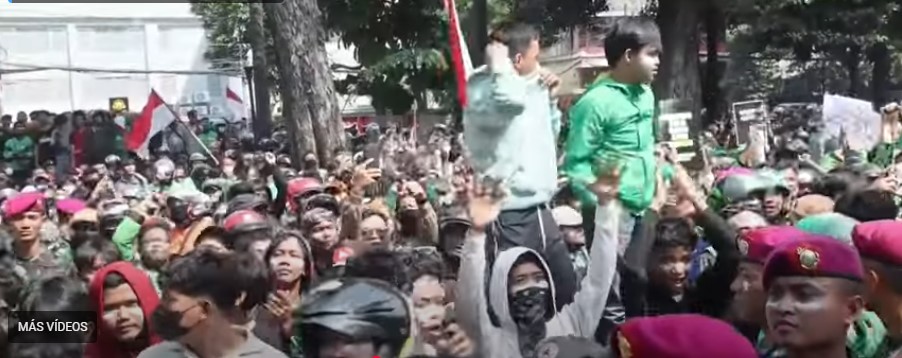Long live the Revolution in Indonesia!

La Marx International
On August 25, 2025, the Indonesian revolution erupted in the fourth most populous country in the world when the country's parliament voted to increase the salaries of parliamentarians—a genuine provocation given that their incomes already exceed 40 times the minimum wage in Jakarta, the country's capital. The government of Prabowo Subianto and the Greater Indonesia Movement Party, known by its Indonesian acronym Gerindra, finds itself cornered by a massive mass mobilization spanning the cities of Jakarta, Malang, Surabaya, Manado, Yogyakarta, Sernad, Sukabemi, Bandung, and Purwokerto, accompanied by solidarity actions in Berlin, New York, and Melbourne.
The capitalist government of Subianto had to suspend attendance at the Tianjin Summit farce, which brought together the criminal capitalist governments of Xi Jinping, Modi, and Putin, following the mass protests that erupted in 30 towns and cities across Indonesia under the slogan "Dissolve Parliament". In Makassar, the capital of South Sulawesi, a crowd set fire to the local parliament, while in Bandung, West Java, another regional parliament was set on fire by protesters. In Surabaya, the country's second-largest city, a crowd took over a police headquarters, burned vehicles, and destroyed fences, clashing with security forces. When the police attempted to suppress the mass protests with brute force, they killed Affan Kurniawan, a 21-year-old driver. In response, people demonstrated day and night, confronting the police.
A revolution in the heart of Southeast Asia
The revolution that has erupted in Indonesia is part of a revolutionary wave sweeping the world, with mass mobilizations in Greece, Serbia, Turkey, South Korea, Georgia, the Palestinian resistance in the Third Intifada, and the military triumphs of the Ukrainian National Liberation Army in the Donbas, among others. The Indonesian revolution, in turn, is taking on the characteristics of 21st-century revolutions, with mass mobilizations, armed confrontations in the streets, self-organization and self-determination, and the emergence of a Front Line against the repression that characterized the revolutions in Hong Kong, Chile, Colombia, the United States with Black Lives Matter, and Ukraine in the Dignity Square uprising, among others. Indonesia's revolutionary process is part of the ongoing revolution in Southeast Asia, which has seen milestones such as the Sri Lankan revolution, the general strike in India, the struggle of the people of Kashmir, the Bangladeshi revolution that overthrew the dictatorial regime of Sheikh Hasina Wazed, and the Awami League, among other processes.
In Indonesia, images of burned-out parliamentary buildings, government offices, and police stations graphically illustrate the depth of the revolutionary process and recall the 1998-99 revolution that toppled the Suharto dictatorship, which had ruled Indonesia with an iron fist for thirty-two years. On August 29, the people burned down the first provincial parliamentary building in Makassar, while the mobilization reached Brebes, Pekalongan, Cilacap, Tegal, Solo, Surakarta, Bandung, West Nusa Tenggara, and Kediri, where hundreds of police stations have been looted and burned. To calm the collective anger, the government promised to investigate and prosecute the officers responsible for the murder of Affan Kurniawan, and the president staged a media spectacle by visiting his family, hugging them, and giving them 200 million rupiah and a house in an attempt to calm the situation. But that didn't stop the revolution; street battles continue to erupt across the country.
Political revolution against political parties, legislators and parliament
Ahmad Sahroni, a National Democratic Party MP, declared that the protesters were "the stupidest people in the world" for demanding the dissolution of parliament. The public's response was swift when Ahmad Sahroni's mansion was attacked and looted, and images showed his luxury items, including a $600,000 Richard Mille watch, being stolen. Eko Patrio, a member of parliament who had also made insulting remarks toward the people, posted a tearful apology video , but to no avail; his home was also looted. Shortly after, the home of another MP, Uya Kuya, suffered the same fate, as did the opulent mansion of Finance Minister Sri Mulyani. The media and the government have attempted to portray the protesters as violent looters, but in reality, the attacks on officials' mansions are an expression of rage, a product of years of oppression, repression, and poverty that the people have suffered.
This adds another element to the Indonesian revolution: the crisis of bourgeois democracy. Throughout the world, people are expressing their hatred of the institutions of the bourgeois democratic regime with an "abstentionist wave" sweeping the globe in elections. This represents an immense advance in the consciousness of millions who are breaking with bourgeois democracy and no longer believing in the traps of the ruling class regime. What we are witnessing in the Indonesian revolution is an even further step: the people are going out to burn down parliaments. It is common in revolutions to see the burning of public offices and police stations, but it is not common to see the burning of parliaments. This shows that the Indonesian revolution has the characteristics of 21st-century revolutions, which imply political revolution, a break of the people from their traditional leaderships that have controlled them for decades, and therefore, radicalization and the emergence of a new independent activism that is the raw material for building a revolutionary leadership.
The reformist left in Indonesia capitulated to the bourgeois democratic regime, just like 99% of the global left, when young people spontaneously raised the chant " Bubarkan DPR " ( "Dissolve the House of Representatives" ). The social democratic reformist left called this slogan "ultra-left" . The Stalinist and social democratic leaders posed the question: "If we dissolve parliament, what will replace it?" " Wouldn't this open the door for the president to become a dictator?" "Dissolving parliament is an irrational demand. We should demand new elections ," they said. Suddenly, this entire reformist left sounds exactly like the government, supporting the regime the people hate and turning their backs on the revolution, writing a new chapter in the crisis of the global left.
The Beginning of the Revolution: Indonesia Gelap (Dark Indonesia)
The revolutionary wave began in Surakarta on February 14 with anti-government protests under the name "Adili Jokowi" or "Try Jokowi," demanding investigations into cases of corruption, money laundering, and extortion. This was followed by the February 17 protests against Presidential Instruction No. 1 of 2025, which entailed a series of massive budget cuts, dubbed "Indonesia Gelap" or "Dark Indonesia," led by the student movement, particularly the All Indonesian Student Union (BEM SI). Starting on March 11, 2025, a new wave of mobilizations broke out under the name Tolak RUU TNI in opposition to the Indonesian National Army Bill, movements that were the continuation of previous processes such as Reformasi Dikorupsi "The Reform is being corrupted" of 2019 , or Peringatan Darurat "Emergency Alert" of 2024.
The process shows that revolution is not a one-act drama. The development of the revolution in Indonesia demonstrates the real development of revolutions, something we have been demonstrating with revolutions such as Syria, Ukraine, or Palestine. The events we are experiencing are a stark and real response to those feverish opinion-makers and analysts who pose as "Marxists" and adopt an ultimatist stance, demanding that revolutions be brief, lightning-fast, dazzling, and led by "Marxist leaders." The charlatan leaders of leftist groups consider revolution to be like those in Netflix or Hollywood movies: They can only be defined as such if those leading them swear an oath on Volume I of Capital or the 14 Theses of Permanent Revolution. Their perspective, as bourgeois intellectuals, and therefore ignorant of Marxism, collides head-on with the overwhelming wall of reality.
Faced with the Indonesian revolution, these leaders refuse to call it such. They lament that this revolution could fail and meet a bloody end due to the lack of revolutionary leadership, using it as an excuse to not defining them as such. What kind of Marxists yearn for a peaceful revolution with 100% guarantees? But while vacillations rain down on the global "left", those who have no doubt that a revolution is underway in Indonesia are the ruling classes: They are desperate to halt the process at any cost, moving heaven and earth to try to contain the uprising with a strategy of incentives and certain concessions combined with repression, but nothing concrete in terms of the cancellation of all the taxes that have been suffocating the people.
The government announced the cancellation of pay raises for parliamentarians, but this has not calmed the movement. It has then intensified repression by deploying the army in major cities and strategic locations, but the movement continues to organize spontaneously through social media and groups in neighborhoods, schools, and universities. We at The Marx International support the demands of the Indonesian people and the revolution. We support the slogan: Dissolve Parliament and remove Prabowo! Along with this slogan, it is important to impose an emergency government of the workers and the people, serving the interests of workers, peasants, the urban poor, and youth. Together, we make our own the demand: Long live the Indonesian revolution! Dissolution of Parliament! Down with Subianto! Trial and punishment for those responsible for the repression! For a workers' and people's government! The triumph of the Indonesian revolution is a step forward in the battle for socialism in Southeast Asia and for global socialism.



